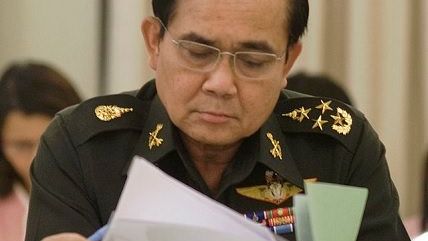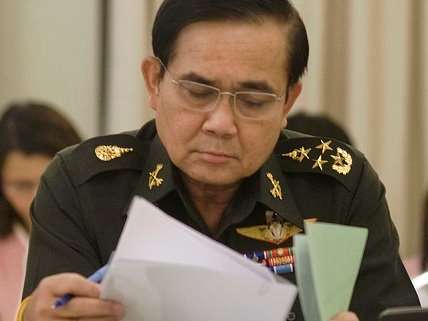Thai Government Lifts Martial Law, In Favor of Unlimited Power for Military Junta Leader
Lessons from Thailand on wishing for stronger leaders.


Last year Thailand, nominally a constitutional monarchy, saw its second coup in ten years after the Constitutional Court ordered the prime minister, Yingluck Shinawatra, the younger sister of the prime minister deposed in the 2006 coup, ordered her to step down for abusing her power. By that time the military had declared martial law and packed the legislature with its members. A military general was selected to replace Yingluck.
Now he wants to lift martial law, and give himself broad-reaching powers instead. He's just waiting for the King's approval. CNN reports:
A statement from Thailand's government said Article 44 of the interim constitution would be invoked "with an aim to deploy military officers in tasks related to maintenance of national order."
Article 44 states, in wide-ranging terms, that when the head of the military junta believes it is necessary in the name of public harmony or to prevent the undermining of national security, then the leader has the power to act as deemed necessary.
Worryingly, acting "as deemed necessary," even if it requires operating outside the constitutional system, is not unheard of in the U.S. President Obama, far from a military junta leader, has nevertheless complained on numerous occasions that he can't act as necessary because the Congress, previously controlled in part, and now in whole, by a party not the president's, won't do what he wants them to. Like his predecessors, of both parties, he's made a habit of doing end-runs around Congress. Sometimes, as with war powers, Congress willingly abdicates its powers.
Thailand is light years away from the U.S. politically; nevertheless it ought to serve as a cautionary tale. The path that starts with political leaders agitating for less division of power to advance agendas they don't want to compromise or even discuss easily ends with those political leaders or their successors demanding absolute power to advance their agenda and blaming the opposition, no matter how ineffectual or powerless, on any failures.


Show Comments (15)